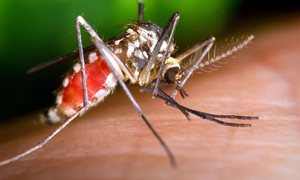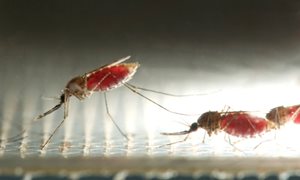20 April 2020
Much research is now being conducted into antibodies to the coronavirus. These antibodies are usually detected in the blood. These blood tests determine whether people have been infected with the coronavirus, which can provide insight into herd immunity in the population. High levels of antibodies in the blood are detectable in people who have recovered from a severe coronavirus infection. However, previous research with other respiratory infections has shown that mild infections, or infections without symptoms, can sometimes induce antibodies in the upper respiratory tract but not in the blood. It is unknown whether this also applies to the coronavirus.
Radboud university medical center researchers Dimitri Diavatopoulos and Marien de Jonge, both theme Infectious diseases and global health, have therefore started a clinical study into COVID-19 in 50 families: the MuCo study. It focuses primarily on whether antibodies can be measured in nasal mucous after a mild infection or exposure to the virus. In collaboration with Utrecht University, Radboud university medical center researchers are investigating whether these antibodies can inhibit infection with the virus. This is called 'virus neutralization'. The MuCo study focuses in part on families with children, because children often experience few or no symptoms. The first results are expected in several months.

Much research is now being conducted into antibodies to the coronavirus. These antibodies are usually detected in the blood. These blood tests determine whether people have been infected with the coronavirus, which can provide insight into herd immunity in the population. High levels of antibodies in the blood are detectable in people who have recovered from a severe coronavirus infection. However, previous research with other respiratory infections has shown that mild infections, or infections without symptoms, can sometimes induce antibodies in the upper respiratory tract but not in the blood. It is unknown whether this also applies to the coronavirus.
Radboud university medical center researchers Dimitri Diavatopoulos and Marien de Jonge, both theme Infectious diseases and global health, have therefore started a clinical study into COVID-19 in 50 families: the MuCo study. It focuses primarily on whether antibodies can be measured in nasal mucous after a mild infection or exposure to the virus. In collaboration with Utrecht University, Radboud university medical center researchers are investigating whether these antibodies can inhibit infection with the virus. This is called 'virus neutralization'. The MuCo study focuses in part on families with children, because children often experience few or no symptoms. The first results are expected in several months.
Fifty hospital workers and their families
The research team, affiliated with the Center for Infectious Diseases of Radboud university medical center, has now visited 50 families at home. The study began with hospital staff from Radboud university medical center, Canisius-Wilhelmina Hospital (both in Nijmegen) and Rijnstate hospital (in Arnhem) who have tested positive for the coronavirus and therefore are, or have been, in home isolation. During the home visit, a sample of nose and throat mucous is taken from all members of the household to determine whether the virus is present. The 50 families are then followed for a month during which the participants themselves take nasal mucous samples at various times by means of an absorbent nasal strip. The also keep a symptom diary to distinguish between mild and more severe symptoms. The samples are then tested with a very sensitive method to determine whether antibodies to the coronavirus are present and whether they can neutralize the virus.RIVM and Utrecht University
This study is led by Radboud university medical center, but is coordinated with RIVM and is complementary to other ongoing studies at RIVM. Radboud university medical center is focusing primarily on immunity in the upper respiratory tract. The study involves a collaboration with Frank van Kuppeveld and Berend Jan Bosch of the Faculty of Veterinary Medicine at Utrecht University, which has substantial expertise about coronaviruses and extensive experience in measuring virus neutralization.Related news items

Grants for research on magnesium deficiency and malaria Vidis for Felix Hol and Jeroen de Baaij
1 July 2022 Radboudumc researchers Jeroen de Baaij and Felix Hol both receive an NWO Vidi grant for their research, respectively on magnesium deficiency in type 2 diabetes and on malaria. go to page
Field research on malaria vaccine offers unexpected surprise
23 May 2022Field research on the effectiveness of a malaria vaccine, came up with unexpected results for an international group of researchers including Benjamin Mordmüller of Radboudumc. The vaccine evokes a broader response against malaria proteins than there are in the vaccine.
go to page
Rubicon grants awarded to three RIMLS researchers
19 April 2022Three researchers have received Rubicon funding from NWO/ZonMw. This will enable Elke Muntjewerff, Laura de Vries and Laurens van de Wiel to do research at a foreign research institute for the next two years.
go to page


